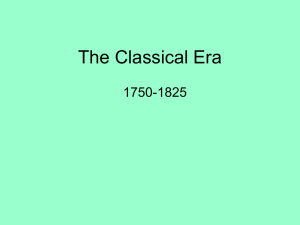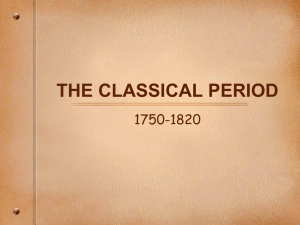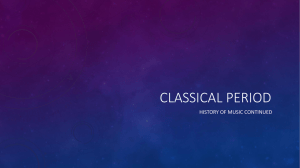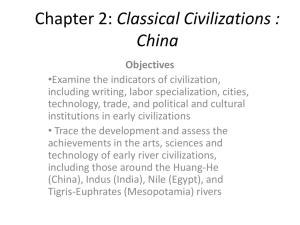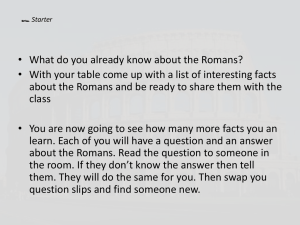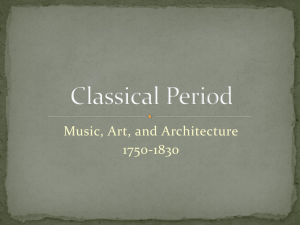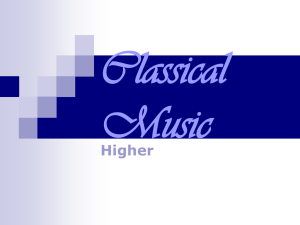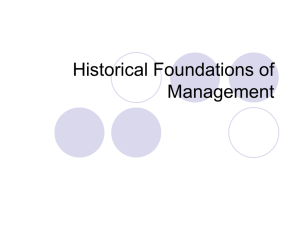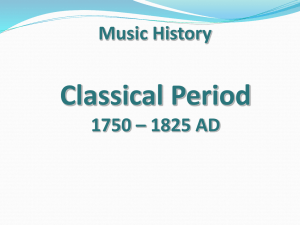Classical Period 1750-1825
advertisement
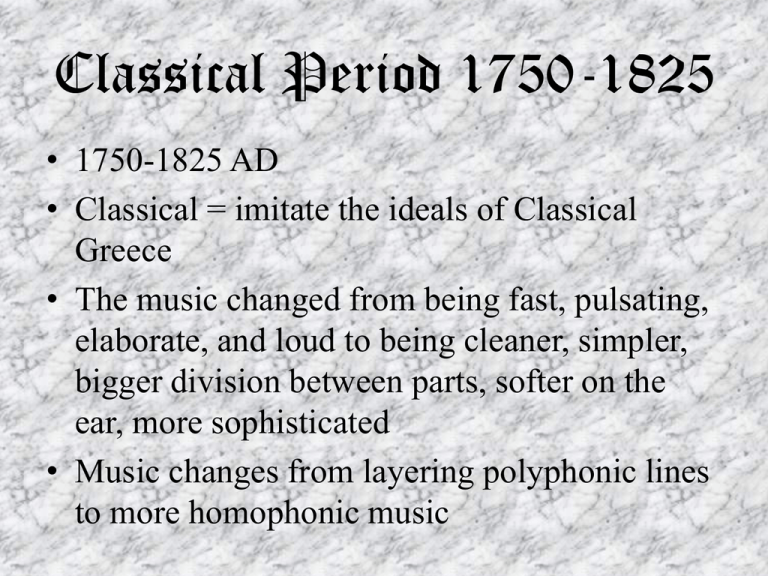
Classical Period 1750-1825 • 1750-1825 AD • Classical = imitate the ideals of Classical Greece • The music changed from being fast, pulsating, elaborate, and loud to being cleaner, simpler, bigger division between parts, softer on the ear, more sophisticated • Music changes from layering polyphonic lines to more homophonic music Classical Period 1750-1825 • Age of Enlightenment – The idea that reason, not custom or tradition should guide human conduct and advance knowledge through science • Philosophers – Voltaire: 1694-1778 – Rousseau: 1712-1778 – Montesquieu: 1689-1755 Classical Period 1750-1825 • Timeline – American Revolution: 1775-1783 • Benjamin Franklin 1706-1790 • Thomas Jefferson 1743-1826 – French Revolution: 1789-1799 – Napoleonic Wars: 1803-1815 • Dissolution of the Holy Roman Empire – Spanish American Revolutions: 1808-1833 – Industrial Revolution: 1750-1850 Classical Period 1750-1825 Classical Period 1750-1825 Classical Period 1750-1825 • Technologies – Factories, steel, steam engine, bifocal glasses, discovery of electricity, idea of refrigeration, railroads, etc. • Growth of the middle class – Merchants and business class expand – Industrial Revolution shifts population from agricultural to manufacturing – Urban cities grow in population, public transportation expands into suburbs Classical Period 1750-1825 – People are making money and spending on essential needs and luxury items as well • Patrons of Music – Renaissance: Catholic Church and Royal Courts – Baroque: Royal Courts, Catholic and Protestant Churches, Nobility – Classical: Nobility, Middle Class, Royal Courts, Churches – The shift in patronage changes in the Classical period due to the new demand for music by the middle class Classical Period 1750-1825 Classical Period 1750-1825 Classical Period 1750-1825 Classical Period 1750-1825 Classical Period 1750-1825 • Public Concerts – The term concert was used to define a public nontheatrical performance of music – These concerts came about when royal court activities became nonexistent and the music patronage was in the hands of nobles and middle class citizens – Music was also presented in private homes and businesses – Rooms were set aside in wealthy homes for small private or public concerts Classical Period 1750-1825 • Public Concerts, cont. – In North America, concerts were performed by traveling companies in Boston, Philadelphia, and New York City • Opera – Opera Seria – serious opera, the libretto is purged of all comic elements. The story is based on heroic stories from mythology and history of Ancient Greece and Rome Classical Period 1750-1825 – Opera Buffa – full length comic opera, uses a large cast of characters – Ballad Opera – a play, usually comic, in which spoken phrases are interspersed with verses set to traditional tunes or popular melodies – Opera Comique – the French form of light opera – Dramma giocoso – a comic opera containing elements of tragedy while remaining basically humorous – Singspiel – the German form of light opera Classical Period 1750-1825 • Songs – Romance – a strophic song usually recounting an ancient love story or an act of gallantry – Motets – this style of song is discontinued by 1750 – Style Galant – music that is light and graceful, elegant, sometimes witty, and pleasing to the ear on the first hearing – Empfindsamer stil - the sensitive style, a composition that contains a continuous change in expression or affection Classical Period 1750-1825 • Sturm und Drang – German drama movement with the aim of frightening, shocking, stunning, or overcoming with emotion Classical Period 1750-1825 Classical Period 1750-1825 Classical Period 1750-1825 Classical Period 1750-1825 Classical Period 1750-1825 Classical Period 1750-1825 Classical Period 1750-1825 Classical Period 1750-1825 • The Symphony – The word “sinfonia” came out of the opera Italian Overture – The Italian Overtures were used to let the audience know that the opera was about to begin, it had no thematic relationship to the opera – Many of the opera overtures were published as independent sinfonie without reference to the opera that it came from – Composers began composing concert sinfonie in three movements, fast-slow-fast Classical Period 1750-1825 • Sonata Form – A multi-movement composition of chamber music that is usually used in symphonic structures – Early sonatas were written for piano, and then piano and violin – Sonata form was used as the first movement in a multi-movement work, such as the symphony • Symphonie Concertante – A three movement composition featuring two or more instrumental soloists with orchestra Classical Period 1750-1825 • Divertimento – A light, entertaining style of music – The concerto grosso was out of date, and was replaced – Music was for special occasions, suitable for background music at social events – Music was for small ensembles, one person per part Classical Period 1750-1825 • String Quartet – Form came into existence when the viola was added to the trio sonata (Violin, keyboard, cello) – Violin, viola, cello, bass – Form developed from the divertimento style • Etude – A complete musical composition featuring at least one consistently recurring problem of physiological, technical, or musical difficulty that requires the player to study the problem and correct the interpretation as well Classical Period 1750-1825 • Exercise – A note pattern drill on a specific technical aspect on the player’s instrument • Domenico Scarlatti – 1685-1757 – Composer, teacher, performer, son of Alessandro Scarlatti – Wrote over 555 keyboard sonatas for Maria Barbara to learn and perform, who was King John V’s daughter Classical Period 1750-1825 • Carl Philipp Emanuel Bach – 1714-1788 – Son of J.S. Bach – C.P.E. Bach mostly wrote for keyboard music at the time, keyboard sonatas – Preferred to write for the harpsichord, composed over 300 pieces – also wrote symphonies, operas, oratorios – Elevates the keyboard from its accompaniment status to an equal in chamber music, and also gave it a leading role in the ensemble Classical Period 1750-1825 • Franz Joseph Haydn – 1732-1809 – Composer, singer, keyboard player, string player – Composed vocal music, keyboard music, chamber music (concert music in court chambers), symphonies, and concerti for violin – Credited for composing music that clearly exemplified the perfected Classical style – Considered the “Father of the Symphony” due to his major contributions to composing symphonies Classical Period 1750-1825 • Haydn’s Symphonies – Composed 104 symphonies – Composed for a patron, had to write according to the orchestra that was available at the time – Early symphonies contained three movements, fastslow-fast – Middle symphonies contained four movements, slowfast-slow-fast. This became the standard of the classical symphonic style – Late symphonies became larger and more complex with more dynamics, greater expressions, and harmonic richness – Symphonies were nicknamed for the distinctive features that were written in the music Classical Period 1750-1825 • Haydn Classical Period 1750-1825 • Wolfgang Amadeus Mozart (W.A. Mozart) – Full Name: Joannes Chrysostomus Wolfgangus Theophilus Mozart – 1756-1791 – Born in Salzburg, Austria – Considered one of the most gifted and talented musicians of our time – Had the natural ability to learn and repeat a song after just listening to it just once – Had the natural ability to compose a piece without making a mistake Classical Period 1750-1825 – Composed Masses, motets, operas, symphonies, keyboard music, string quartet music, chamber music, concerti, – Famous operas include The Marrage of Figaro and Don Giovanni – Composed many of the famous tunes and melodies that are still used today in commercials, television shows, and movies Classical Period 1750-1825 • Mozart Classical Period 1750-1825 • Ludwig Van Beethoven – 1770-1827 – Bonn, Germany – Composer, piano player, violin player, organist – No formal education beyond elementary school – Musically trained by father until age 9 when he began formal lessons on the organ and in composition – Beethoven traveled across Germany performing and composing music to make a living until his mother passed away in 1787 Classical Period 1750-1825 – After his mother’s death, Beethoven’s father became a heavy drinker and Beethoven has to assume the responsibility as head of the family at the age of 18 – Beethoven traveled to Vienna where he found it difficult to find work at first – he would take jobs as a piano player at private social gatherings, he would publish compositions and sell them, and begin to hold small concerts to establish a reputation – Around age 30, Beethoven began to experience some hearing loss, this was a huge blow to Beethoven that sent him into a tailspin to the point where he considered suicide Classical Period 1750-1825 – In 1802, Beethoven came to grips with his deafness and with a renewed sense energy he was determined to become a great composer – In 1815, his brother Kaspar died, leaving Beethoven to take care of Kaspar’s son, Karl, after a long legal battle with Kaspar’s mother – In 1826, Karl attempted suicide which was a huge blow to Beethoven who decided to enroll Karl in the army – Beethoven continued to compose music as his hearing continued to decline Classical Period 1750-1825 • After complication with pneumonia, Beethoven died in 1827, leaving his entire estate to Karl • Beethoven composed symphonies, overtures, ballets, operas, Masses, oratorios, violin concertos, piano concertos, piano sonatas, string quartets, and over 200 folk songs • Beethoven’s most famous pieces are the “Moonlight Sonata”, “Fur Elise”, “Symphony No.5”, and “Symphony No. 9” Classical Period 1750-1825 • Beethoven Classical Period 1750-1825 • First North American Composers – Francis Hopkinson • 1737-1791 – James Lyon • 1735-1794 – William Billings • 1746-1800 – John Ates • 1740-1811 • North American composers wrote music for singing schools which were geared towards making people better singers in their churches Classical Period 1750-1825 • Benjamin Franklin – 1706-1790 – Played guitar and sticcado-pastorale (a mixture of xylophone with glass bars) – Invented the glass harmonica Classical Period 1750-1825 • Thomas Jefferson – 1743-1826 – Violinist – Enjoyed invited people to house to make music due to his abundant supply of sheet music – After the Federal Library was burned down in the War of 1812, Jefferson sold his music books to the government which became the starting point for the Music Division of the Library of Congress

